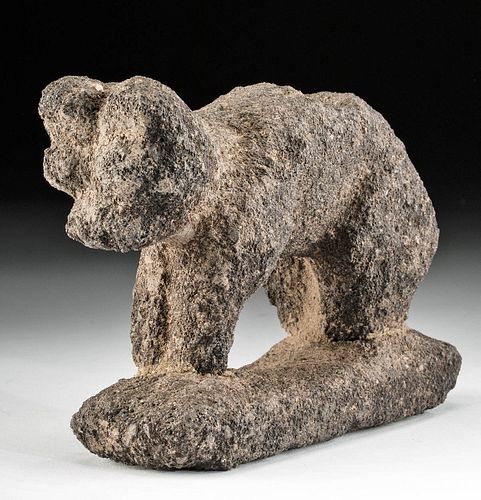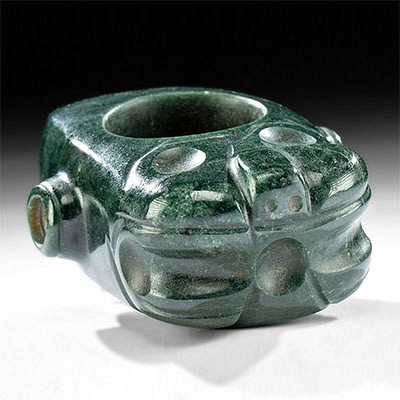Prehistoric Mississippian Stone Bear Effigy Pipe
Lot 125
About Seller
Artemis Fine Arts
686 S Taylor Ave, Ste 106
Louisville, CO 80027
United States
Selling antiquities, ancient and ethnographic art online since 1993, Artemis Gallery specializes in Classical Antiquities (Egyptian, Greek, Roman, Near Eastern), Asian, Pre-Columbian, African / Tribal / Oceanographic art. Our extensive inventory includes pottery, stone, metal, wood, glass and textil...Read more
Estimate:
$2,500 - $3,000
Absentee vs Live bid
Two ways to bid:
- Leave a max absentee bid and the platform will bid on your behalf up to your maximum bid during the live auction.
- Bid live during the auction and your bids will be submitted real-time to the auctioneer.
Bid Increments
| Price | Bid Increment |
|---|---|
| $0 | $25 |
| $300 | $50 |
| $1,000 | $100 |
| $2,000 | $250 |
| $5,000 | $500 |
| $10,000 | $1,000 |
| $20,000 | $2,500 |
| $50,000 | $5,000 |
| $100,000 | $10,000 |
| $200,000 | $20,000 |
About Auction
By Artemis Fine Arts
Sep 10, 2020
Set Reminder
2020-09-10 10:00:00
2020-09-10 10:00:00
America/New_York
Bidsquare
Bidsquare : Antiquities | Asian | Ethnographic Art
https://www.bidsquare.com/auctions/artemis-gallery/antiquities-asian-ethnographic-art-5546
Featuring classical antiquities, ancient and ethnographic art from cultures encompassing the globe. Egyptian, Greek, Roman, Etruscan, Near Eastern, Asian, Pre-Columbian, Native American, African / Tribal, Oceanic, Spanish Colonial, Russian, Fossils, Fine Art, more! Artemis Fine Arts info@artemisgallery.com
Featuring classical antiquities, ancient and ethnographic art from cultures encompassing the globe. Egyptian, Greek, Roman, Etruscan, Near Eastern, Asian, Pre-Columbian, Native American, African / Tribal, Oceanic, Spanish Colonial, Russian, Fossils, Fine Art, more! Artemis Fine Arts info@artemisgallery.com
- Lot Description
Native American, Mississippian, found on private land in Mississippi County, Arkansas, US, ca. 200 to 1000 CE. Finely carved from a silicate based stone, a rare Mississippian bear effigy pipe. Pipes like this example were not just made for the simple act of smoking; scholars believe that they played a religious role as well, and various archaeological sites from the period, including the Hopewell Mound sites, have contained the remains of hundreds of destroyed platform pipes, including effigy pipes like this. Others were buried with their owners individually. Effigy platform pipes are believed to be totemic animals or spirits from Native cosmology. According to ethnographic sources, the bear was thought to serve as a protector and symbolize courage, strength, good omens, and leadership. Size: 6.25" L x 2" W x 4" H (15.9 cm x 5.1 cm x 10.2 cm)
Smoking pipes played an important role in Eastern Woodland culture, which spanned from sub-Arctic Canada to the southern United States. The earliest evidence we have for the use of tobacco in this area comes from ca. 100 to 200 CE. In addition and prior to tobacco, we know from ethnohistorical accounts that people smoked a variety of other plants, including dogwood, juniper, sumac, and bearberry.
This piece is accompanied by Certificate of Authenticity from T&T Archaeological Consulting, LLC. (February 11, 2017 - SH203444).
Provenance: private Tennessee, USA collection; found by John Ham on private land in Mississippi County, Arkansas, USA
All items legal to buy/sell under U.S. Statute covering cultural patrimony Code 2600, CHAPTER 14, and are guaranteed to be as described or your money back.
A Certificate of Authenticity will accompany all winning bids.
We ship worldwide and handle all shipping in-house for your convenience.
#155798Intact. Expected weathered surface commensurate with age, though the form is still strong. Great deposits on surface.Condition
- Shipping Info
-
All shipping is handled in-house for your convenience. Your invoice from Artemis Gallery will include shipping calculation instructions. If in doubt, please inquire BEFORE bidding for estimated shipping costs for individual items.
-
- Buyer's Premium



 EUR
EUR CAD
CAD AUD
AUD GBP
GBP MXN
MXN HKD
HKD CNY
CNY MYR
MYR SEK
SEK SGD
SGD CHF
CHF THB
THB

















